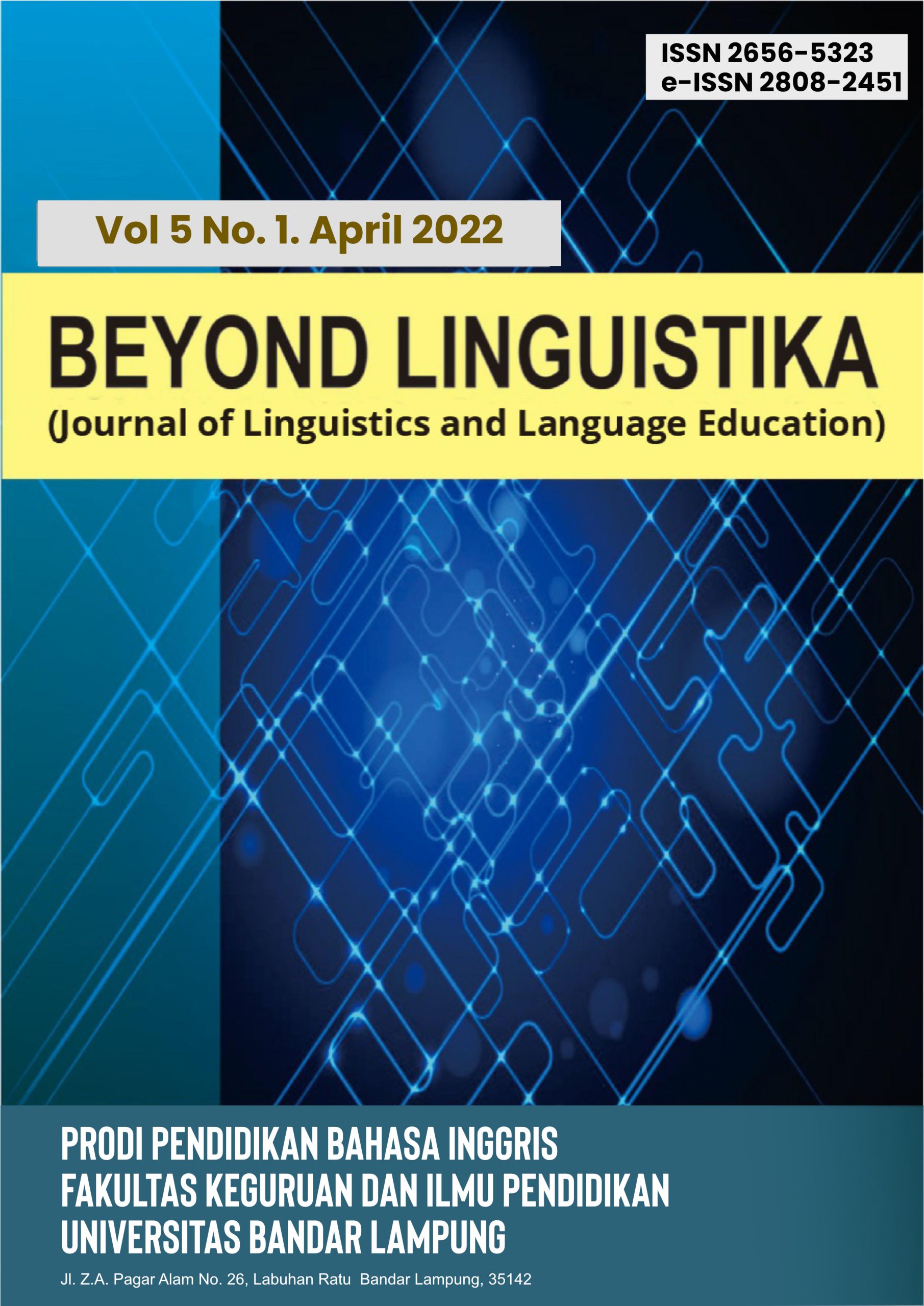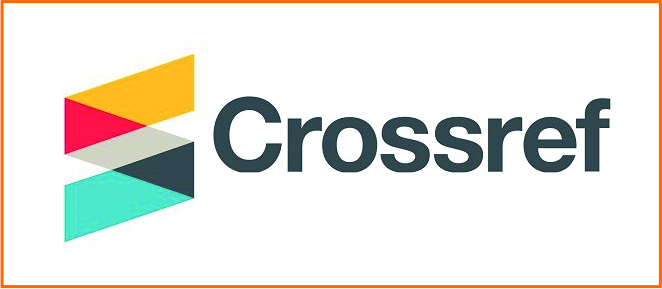INVESTIGATING THE PHILOSOPHICAL FOUNDATION OF AN ESP COURSEBOOK ENGLISH FOR ACCOUNTING
Abstract
Textbooks play an essential role in the teaching of ESP (English for Specific Purposes), especially in EFL (English as a Foreign Language) settings. Finding out the philosophical foundation of a commercial textbook can be a basis of whether or not that textbook is suitable for a particular learning context. Hence, this study aims to describe and analyze the philosophical foundation of an English for Specific Purpose (ESP) coursebook entitled ‘English for Accounting’ published by Oxford University Press, and to reveal the inferred intent of the book. This study employs a qualitative design with a content-analysis approach, in which data are described verbally. The data making was done by describing and analyzing the textbook using Littlejohn’s adapted model (2011) consisting of describing the book, analyzing the contents, and making inference. The findings show that the philosophical foundations of the textbook are eclectic, as the book employs the principles of progressivism, critical pedagogy, and reconstructivism. Regarding the intent, the book is written in order to facilitate learners to use spoken and written English for communication in various accounting business settings.
Keywords
Full Text:
PDFReferences
Adnan, Salwa. (2011). The Important Skills ESP Teachers Need to be Qualified to Teach ESP Courses, Basra Studies Journal, 11(11), 45–67.
Alismail, Halah Ahmed, & McGuire, Patrick. (2015). 21 St Century Standards and Curriculum: Current Research and Practice, Journal of Education and Practice", 6(6), 150–155. Retrieved from http://files.eric.ed.gov/fulltext/EJ1083656.pdf
Alwasilah, A. Chaedar. (2013). Policy on Foreign Language Education in Indonesia, International Journal of Education, 7(1), 1–19. https://doi.org/10.17509/ije.v7i1.5302
Alwasilah, A. Chaedar. (2014). Filsafat bahasa dan pendidikan (4th ed.). Bandung: PT Remaja Rosdakarya.
Anugerahwati, Mirjam. (2019). Integrating the 6Cs of the 21st Century Education into the English Lesson and the School Literacy Movement in Secondary Schools 2019(2015), 165–171. https://doi.org/10.18502/kss.v3i10.3898
Baleghizadeh, S., & Motahed, Jamali. (2010). An analysis of the ideological content of internationally-developed British and American ELT textbooks, The Journal of Teaching Language Skills, 2(2), 1–28.
Bialik, Maya & Fadel, Charles. (2015). Skills for the 21 st Century : What Should Students Learn ? Boston, Massachusetts: Center for Curriculum Redesign.
Cho, Youngdal & Park, Yunkyoung. (2016). Textbook as a contradictory melting-pot: an analysis of multicultural content in Korean textbooks, Asia Pacific Journal of Education, 36(1), 111–130. https://doi.org/10.1080/02188791.2014.924388
Fullan, Michael & Scott, Geoff. (2014). Education Plus. Seattle, Washington: Collaborative Impact SPC.
Gezer, Melehat. (2018). An analysis of correlations between prospective teachers’ philosophy of education and their attitudes towards multicultural education, Cogent Education, 5(1), 1–21. https://doi.org/10.1080/2331186X.2018.1475094
Hasan, Engking Soemawarman. (2001). Landasan Filosofis Pengembangan Pendidikan Terpadu Pesantren (Refleksi Hasil Studi Pendidikan Terpadu Pe- santren di Jawa Barat), Mimbar Pendidikan, XX(4), 51–60.
Ilyas, Hamzah Puadi. (2015). Critical Thinking : Its Representation in Indonesian ELT Textbooks and Education , Unpublished thesis, University of York.
Iswati, Luluk. (2019). Developing ADDIE model-based ESP coursebook, Indonesian EFL Journal, 5(2), 103–112. https://doi.org/10.25134/ieflj.v5i2.1804.Received
Jeyaraj, Joanna Joseph & Harland, Tony. (2019). Linking critical pedagogy practice to higher education in Malaysia : insights from English language teachers, Asia Pacific Journal of Education, 00(00), 1–13. https://doi.org/10.1080/02188791.2019.1572590
Kusni, Kusni. (2013). Reformulating English for Specific Purposes (ESP) in Indonesia: current issues and future prospects, SELT, 36–48.
Lamb, Stephen, Doecke, Esther, & Maire, Quentin. (2017). Key Skills for the 21st Century: An evidence-based review, In NSW Government. Retrieved from https://education.nsw.gov.au/
Littlejohn, Andrew. (2011). The analysis of language teaching materials: inside the Trojan Horse, In Brian Tomlinson (Ed.), Materials Development in Language Teaching. https://doi.org/10.1590/S0100-06832007000100006
Mardiana, & Suyata, Pujiati. (2017). Evaluating the philosophical foundation of 2013 curriculum, Jurnal Penelitian Dan Evaluasi Pendidikan, 21(2), 1689–1699. https://doi.org/10.1017/CBO9781107415324.004
Mattarima, Karim & Rahim Hamdan, Abdul. (2011). The Teaching Constraints of English as a Foreign Language in Indonesia: The Context of School Based Curriculum", Sosiohumanika, 4(2), 2011. Retrieved from http://www.journals.mindamas.com/index.php/sosiohumanika/article/viewFile/452/450
Meredith, David. (2003). Current Philosophy & Practice in ESL/EFL Reading Education: An Analysis
Munir, Sirajul. (2016). Redesigning english for specific purposes (ESP) class: integrating language and islamic values in producing a textbook, Batusangkar International Conference, (October 2016), 15–16.
National Education Association, n.d., Preparing 21st Century Students for a Global Society An Educator ’ s Guide to the “ Four Cs .”
Ollerhead, Sue, & Oosthuizen, Johan. (2012). Meaning-focused vs Form-focused L2 Instruction: Implications for Writing Educational Materials for South African Learners of English, Stellenbosch Papers in Linguistics, 36(0), 59–84. https://doi.org/10.5774/36-0-13
Parizoska, Jelena, & Rajh, Ivanka. (2017). Idiom variation in business English textbooks: A corpus-based study, ESP Today, 5(1), 46–67. https://doi.org/10.18485/esptoday.2017.5.1.3
Parlindungan, Firman, Rifai, Irfan, & Safriani, Afida. (2018). The representation of Indonesian cultural diversity in middle school English textbooks, Indonesian Journal of Applied Linguistics, 8(2), 289–302. https://doi.org/10.17509/ijal.v8i2.13276
Radic-Bojanic, Bojanic, & Topalov, Jagoda P. (2016). Textbooks in the EFL classroom: Defining, assessing and analyzing, Zbornik Radova Filozofskog Fakulteta u Pristini, (46–4), 137–153. https://doi.org/10.5937/zrffp46-12094
Ranjan Dash, & Nikunja, Shri. (2017). Philosophical Foundation of Education. In J. A. P. Hoogervorst (Ed.), Philosophical Foundation (pp. 87–191). https://doi.org/10.1007/978-3-319-72107-1_2
Richards, Jack. C. (2015). Key issues in language teaching, Cambridge: Cambridge University Press.
Saragih, Erikson. (2014). Designing ESP Materials for Nursing Students Based On Needs Analysis, International Journal of Linguistics, 6(4), 59. https://doi.org/10.5296/ijl.v6i4.5983
Setyono, Budi, & Widodo, Handoyo P. (2019). The representation of multicultural values in the Indonesian Ministry of Education and Culture-Endorsed EFL textbook: a critical discourse analysis, Intercultural Education, 30(4), 383–397. https://doi.org/10.1080/14675986.2019.1548102
Simpson, Douglas. J., & Duemer, Lee. S. (2011). Philosophy of Education : Looking Back to the Crossroads and Forward to the Possibilities, Counterpoints, 352(2011), 199–208.
Suprihatin, E. Wara. (2007). Filosofi sebagai landasan pengembangan kurikulum, Jurnal Manajemen Pendidikan, 1(3), 48–59.
Szepe, Gyorgy. (2010). Linguistic aspects of intercultural communication, In D. E. Ingram, D. Cunningham, & A. Hatoss (Eds.), An international perspective on language policies, practices and proficiencies (Vol. 37, pp. 1–420). https://doi.org/10.4314/tvl.v37i2.53853
Trisyanti, Umi. (2009). Developing Materials for Esp (English for Specific Purposes) Class, Jurnal Sosial Humaniora, 2(1), 66–77. https://doi.org/10.12962/j24433527.v2i1.666
Widodo, Handoyo. P. (2018). Situating Moral and Cultural Values in ELT Materials: The Southeast Asian Context, In English Language Education (Vol. 9). https://doi.org/10.1007/978-3-319-63677-1
Xiang, Rong, & Yenika-Agbaw, Vivian. (2019). EFL textbooks, culture and power: a critical content analysis of EFL textbooks for ethnic Mongols in China, Journal of Multilingual and Multicultural Development, 0(0), 1–15. https://doi.org/10.1080/01434632.2019.1692024
Xiong, Tao., & Qian, Yamin. (2012). Ideologies of English in a Chinese high school EFL textbook: A critical discourse analysis, Asia Pacific Journal of Education, 32(1), 75–92. https://doi.org/10.1080/02188791.2012.655239
Yi, Jiang. (2013). What Is Philosophical Education ?, Frontiers of Philosophy in China, 8(2), 273–277.
Zuchdi, Darmiyati, & Arifah, Wiwik. (2019). Analisis konten etnografi & grounded theory dan hermeneutika dalam penelitian. Yogyakarta: Bumi Aksara.
DOI: http://dx.doi.org/10.36448/bl.v5i1.2513
Refbacks
- There are currently no refbacks.















